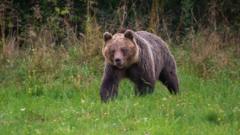Slovakia's cabinet has authorized the culling of a quarter of its brown bear population after a fatal bear attack. The decision has sparked outrage among conservationists who argue that it breaches international obligations and question the effectiveness of such measures for public safety, amidst a growing concern on both sides of the debate.
Slovakia Plans Mass Cull of Brown Bears Following Fatal Attack

Slovakia Plans Mass Cull of Brown Bears Following Fatal Attack
In response to rising bear-related incidents, Slovakia's government has approved a controversial plan to cull 350 bears, intensifying the debate between public safety and conservation efforts.
Following a fatal bear attack in Central Slovakia, the government has moved to increase the culling of brown bears in the region. Prime Minister Robert Fico's cabinet declared its plan to shoot approximately 350 bears from a population of roughly 1,300, citing public safety as the primary concern amid rising incidents involving the creatures.
The recent state of emergency expands the culling initiative to 55 out of 79 districts, essentially encompassing most of Slovakia. As a result, legal protections for bears have been relaxed, allowing authorities to eliminate bears that venture close to populated areas. Up until the end of 2024, approximately 93 bears have already been killed under the previous legal framework.
The government's action has drawn harsh criticism from conservationists, who argue that the culling may violate international wildlife agreements and could be illegal. Michal Wiezek, an ecologist and member of the European Parliament from the opposition Progressive Slovakia party, described the decision as "absurd," accusing the Environment Ministry of failing to manage bear encounters adequately. He expressed concern that this extreme approach was merely a cover-up for government shortcomings and urged European Commission intervention, emphasizing that most bear encounters proceed without violent incidents.
The immediate catalyst for the culling decision was the death of a 59-year-old man near Detva, found with severe injuries consistent with a bear attack. This incident, along with others in recent years, including the death of a Belarusian tourist in March, has intensified public anxiety surrounding bear interactions.
Environment Minister Tomas Taraba stated that while the bear population exceeds 1,300, he believes reducing it to around 800 could help mitigate risks to human safety. However, experts contend that the bear population has stabilized at around 1,270, making the need for such drastic measures questionable.
Bears inhabit the Carpathian mountain range, spanning across several countries including Slovakia, Romania, and Poland. The ongoing cull raises critical questions regarding wildlife management, the balance between conservation and public safety, and how governments address human-wildlife interactions in a rapidly changing environment. The discussions continue as various stakeholders weigh in on the ethical implications of the government's controversial approach.






















